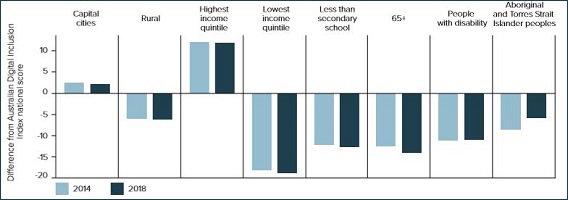Despite NBN Co decrying success in its latest financial results, the national broadband network is still struggling to bring Australia into the 21st century.
Independent government advisor Infrastructure Australia released its latest Infrastructure Audit this week, showing that Australians still think they are paying too much for services that deliver mixed results.
Worst off are those from poorer households who are paying three times the proportion of their income for telecommunications services than top earners.
“The quality of telecommunications services varies for different groups across Australia, with digital inclusion lagging for low-income households, people who did not complete secondary school, those aged over 65 and people with disability,” the report said.
“Without action, these people will be increasingly excluded from an increasingly digital world, exacerbating disadvantage.”
Already marginalised Australians are most disadvantaged by the digital divide. Source: Infrastructure Australia
The NBN is expected to be completed next year and NBN Co posted optimistic financial figures today.
Total revenue, average revenue per user, and number of customers are all up around 40 per cent on last year’s results.
But for those lost in the digital divide, long-term profitability of our taxpayer-driven broadband network is less concerning than a lack of access to Australians in desperate need of reliable, affordable communications technology.
CEO of the Australian Communications Consumer Action Network (ACCAN), Teresa Corbin, said struggling families are always looking for ways to cut costs.
“For some, this can mean giving up their home broadband – leaving them without access to the internet, or forcing them to rely on mobile internet plans that aren’t sufficient for family needs and can often be more expensive in the long run,” she said.
“So much of what we do every day is now reliant on access to the internet – from doing our banking, to accessing government services and applying for jobs.
“Even kids need to get online to do homework these days.
“When high costs limit access to this essential service, low income earners and their families are locked out of these basic opportunities and can suffer real consequences.”
ACCAN wants to see the NBN offer a concessional wholesale price for households on government assistance, therefore allowing telcos to provide cheaper services to low income earners.
The Infrastructure Australia audit reported that nearly half of Australians consider their broadband services to be ‘costly’, but NBN Co denies there is a problem with consumer cost.
“NBN Co recently commissioned economics analyst firm Alpha Beta to compare retail pricing in real terms and found that, in a study of 4,578 broadband plans from 22 countries, Australia was the 7th most affordable market,” an NBN Co spokesperson said.
“The research also revealed Australian telecommunications prices have fallen since 2000 due to a significant drop in prices in the last five years as the rollout of the NBN access network gathered pace.”
The spokesperson also said NBN Co was in the process of “reviewing industry submissions to our current pricing review consultation” – a review which included asking telcos if they were keen on charging users more for streaming video.











